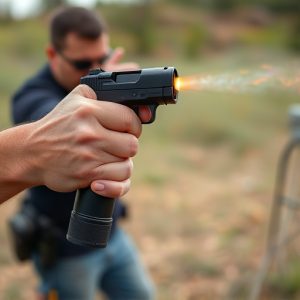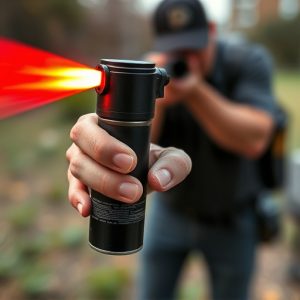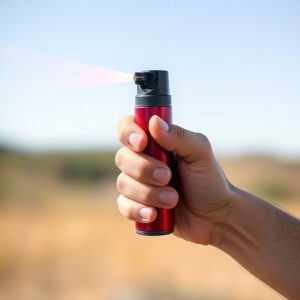Mastering Legal Pepper Spray Carry: Choosing & Using Your Defense Unit
Understanding local laws regarding pepper spray possession, purchase, and carriage is crucial before…….
Understanding local laws regarding pepper spray possession, purchase, and carriage is crucial before considering a handheld unit for self-defense. Regulations vary widely by jurisdiction, including age restrictions, permit requirements, and restricted locations. Compliance with these rules ensures legal adherence when carrying pepper spray, which requires balancing legal factors, personal needs, and practical considerations like concentration, range, and weight. Responsible use includes obtaining necessary permits or licenses, safe storage, and adhering to legal boundaries for enhanced personal safety without causing harm.
“Uncover the power of self-defense with a handheld pepper spray unit, a compact yet potent tool designed to deter and disable assailants. This comprehensive guide explores everything you need to know about navigating the legalities of pepper spray possession, selecting the right device for your specific needs, and ensuring safe storage and carry methods. From understanding local regulations to exploring real-world use cases, learn how to legally carry pepper spray effectively and responsibly.”
- Understanding Pepper Spray Legalities: What You Need to Know
- Choosing the Right Handheld Pepper Spray Unit for Your Needs
- Safely Storing and Carrying Pepper Spray Legally
- Effective Use Cases for Pepper Spray Defense Units
Understanding Pepper Spray Legalities: What You Need to Know
Before considering a handheld pepper spray defense unit, it’s crucial to understand the legalities surrounding its possession and use. The rules vary significantly from one jurisdiction to another, so “how to legally carry pepper spray” is not a one-size-fits-all question. In many places, civilian use of pepper spray is legal for self-defense purposes, but strict regulations govern its sale, purchase, and carriage. These may include age restrictions, requirement for a permit or license, and specific limitations on where it can be carried (e.g., in your home, car, or public spaces).
Some regions differentiate between pepper spray and other types of self-defense tools, with certain laws applying only to one or the other. Additionally, there are often restrictions on the strength or quantity of pepper spray allowed for civilian use. It’s essential to research and comply with local laws and regulations to ensure you’re acting within legal boundaries when carrying a pepper spray defense unit.
Choosing the Right Handheld Pepper Spray Unit for Your Needs
Choosing the right handheld pepper spray unit is crucial for ensuring your personal safety while adhering to local laws and regulations on how to legally carry pepper spray. Several factors should guide your selection process, including the concentration of capsaicoid (the active ingredient), range and spray pattern, weight and size for ease of carrying, and additional features like a built-in alarm or flashlight.
Understanding state and local laws on pepper spray is essential before making a purchase. Each region has different rules regarding where and how you can carry pepper spray, so ensure the unit you choose complies with these regulations. Consider also your specific needs: whether for self-defense at home, personal protection while traveling, or outdoor activities. This will help narrow down options to find a handheld pepper spray unit that offers the perfect balance of effectiveness and portability.
Safely Storing and Carrying Pepper Spray Legally
Knowing how to legally carry pepper spray is essential for personal safety, especially in areas with high crime rates or during outdoor activities. Each jurisdiction has specific laws and regulations regarding the possession and carrying of pepper spray, so it’s crucial to understand these rules before purchasing and using a handheld defense unit. One must check their local state or provincial laws, as well as any municipal ordinances, to ensure compliance.
To legally carry pepper spray, individuals typically need to obtain a permit or license from relevant authorities. This process often involves background checks, training courses, and proof of responsible ownership. It’s important to store the spray safely in its original packaging, keeping it out of reach of children and unauthorized persons. Carrying cases or holsters designed for legal transport can help ensure compliance while providing easy access during emergencies.
Effective Use Cases for Pepper Spray Defense Units
Pepper spray defense units are versatile tools with various effective use cases, especially in personal safety scenarios. For individuals seeking to protect themselves against potential threats, pepper spray offers a non-lethal yet powerful deterrent. It is particularly useful in situations where one might encounter aggressive dogs, hostile individuals, or even as a means of disabling an attacker during an assault. The legal carriage of pepper spray varies by jurisdiction, so it’s crucial to understand local regulations regarding its possession and use.
Knowing how to legally carry pepper spray is essential for responsible use. In many regions, obtaining a permit or license for carrying self-defense spices is required, often involving background checks and training on safe handling practices. This ensures that individuals using such devices are well-informed and capable of employing them effectively while adhering to legal boundaries, thereby enhancing personal safety without causing unnecessary harm.
Handheld pepper spray defense units can be a valuable tool for personal safety, but it’s crucial to understand local legalities regarding their possession and use. By choosing the right unit, storing and carrying them legally, and knowing effective use cases, you can ensure your safety without breaking the law. Always remember: understanding the rules is the first step towards responsible self-defense.


